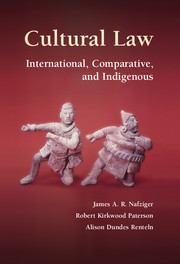Book contents
- Frontmatter
- Contents
- Preface
- Acknowledgments
- 1 Cultural Law: An Introduction
- 2 Culture and Law: The Basics
- 3 Cultural Heritage Law: Introduction
- 4 Cultural Material: Protection and Cooperation
- 5 Cultural Material: Rectification, Criminal Justice, and Dispute Resolution
- 6 Intangible Cultural Heritage
- 7 Museums
- 8 Sports
- 9 Religion
- 10 Language and Linguistic Expression
- Index
- References
9 - Religion
Published online by Cambridge University Press: 05 June 2012
- Frontmatter
- Contents
- Preface
- Acknowledgments
- 1 Cultural Law: An Introduction
- 2 Culture and Law: The Basics
- 3 Cultural Heritage Law: Introduction
- 4 Cultural Material: Protection and Cooperation
- 5 Cultural Material: Rectification, Criminal Justice, and Dispute Resolution
- 6 Intangible Cultural Heritage
- 7 Museums
- 8 Sports
- 9 Religion
- 10 Language and Linguistic Expression
- Index
- References
Summary
Toby Lester, Oh, Gods!Atlantic Monthly, February 2002, at 37
Contemporary theories of social and political behavior tend to be almost willfully blind to the constantly evolving role of religion as a force in global affairs. The assumption is that advances in the rational understanding of the world will inevitably diminish the influence of that last, vexing sphere of irrationality in human culture: religion. Inconveniently, however, the world is today as awash in religious novelty, flux, and dynamism as it has ever been – and religious change is, if anything, likely to intensify in the coming decades. The spectacular emergence of militant Islamist movements during the twentieth century is surely only a first indication of how quickly, and with what profound implications, change can occur.
It's tempting to conceive of the religious world – particularly when there is so much talk of clashing civilizations – as being made up primarily of a few well-delineated and static religious blocs: Christians, Jews, Muslims, Buddhists, Hindus, and so on. But that's dangerously simplistic. It assumes a stability in the religious landscape that is completely at odds with reality. New religions are born all the time. Old ones transform themselves dramatically. Schism, evolution, death, and rebirth are the norm. And this doesn't apply only to religious groups that one often hears referred to as cults. Today hundreds of widely divergent forms of Christianity are practiced around the world. Islam is usually talked about in monolithic terms (or, at most, in terms of the Shia-Sunni divide), but one almost never hears about the 50 million or so members of the Naqshabandiya order of Sufi Islam, which is strong in Central Asia and India, or about the more than 20 million members of various schismatic Muslim groups around the world. Think, too, about the strange rise and fall of the Taliban. Buddhism, far from being an all-encompassing glow radiating benignly out of the East, is a vast family of religions made up of more than 200 distinct bodies, many of which don't see eye-to-eye at all. Major strands of Hinduism were profoundly reshaped in the nineteenth century, revealing strong Western and Christian influences.
- Type
- Chapter
- Information
- Cultural LawInternational, Comparative, and Indigenous, pp. 831 - 914Publisher: Cambridge University PressPrint publication year: 2010



